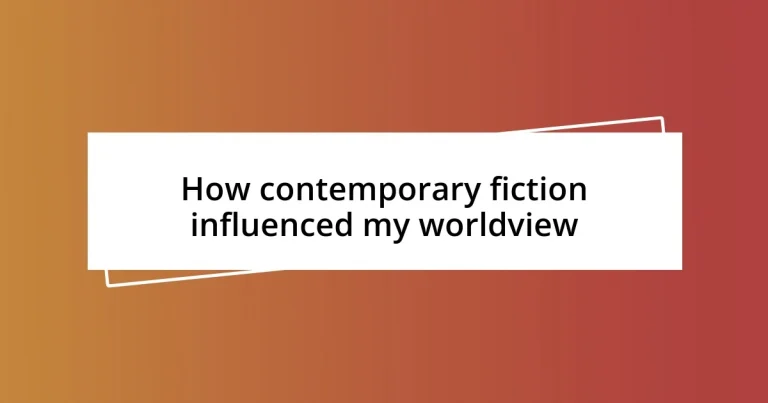Key takeaways:
- Contemporary fiction fosters empathy and critical thinking by presenting diverse perspectives, encouraging readers to confront societal norms and personal assumptions.
- Key themes in contemporary fiction, such as identity, social justice, and resilience, inspire introspection and personal growth, prompting readers to advocate for change in their communities.
- Diverse voices in literature highlight underrepresented experiences, challenging biases and motivating readers to engage in advocacy and deepen their understanding of global issues.
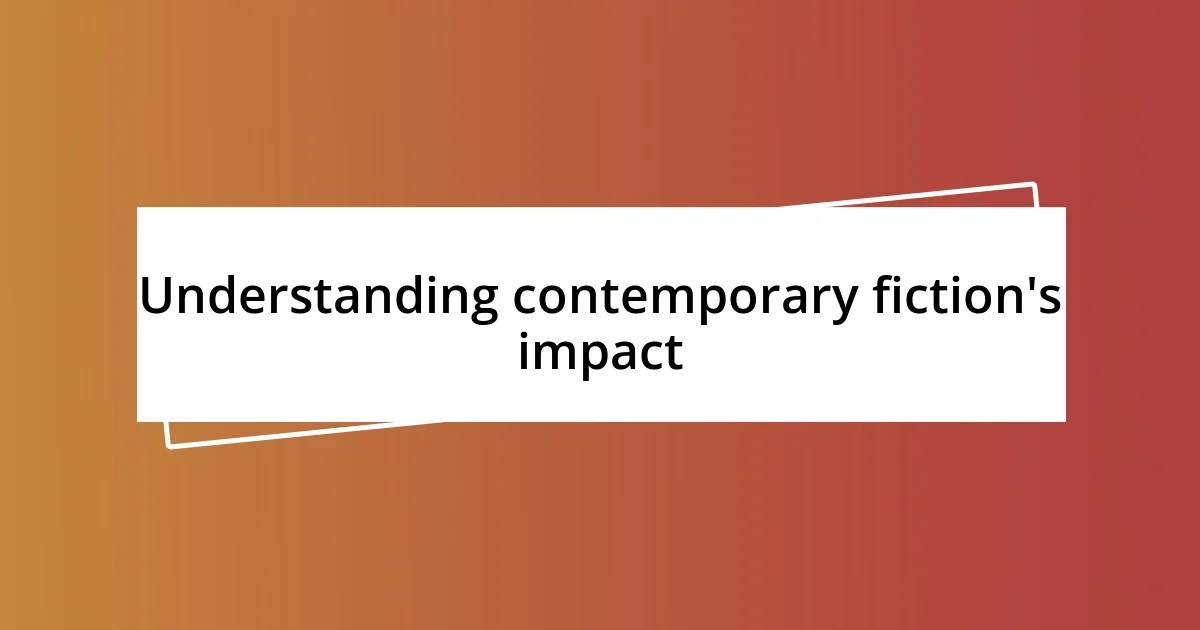
Understanding contemporary fiction’s impact
Contemporary fiction has an incredible capacity to shape our worldviews because it often reflects the complexities of modern life. I vividly remember reading a novel set in a culturally diverse neighborhood, and it opened my eyes to lives vastly different from mine. How often do we step outside our own experiences to truly understand others?
As I delved deeper into various contemporary works, I felt a shift in my perspective toward social issues. One particular story about an immigrant family struck a chord with me; it not only highlighted their struggles but also illustrated their resilience and hope. Have you ever encountered a character that made you rethink your assumptions about a certain group of people?
These narratives encourage empathy and critical thinking, allowing us to navigate the nuances of humanity. When I finished one such book, I found myself questioning societal norms I’d taken for granted. It’s fascinating to consider how a single story can spark such profound introspection, isn’t it?
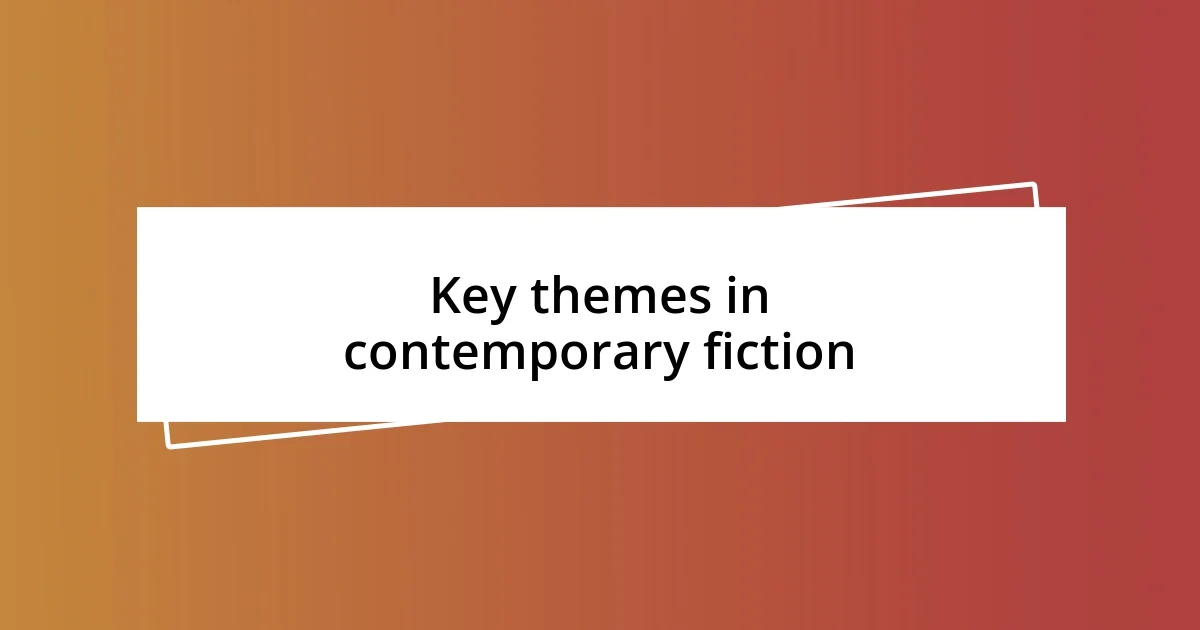
Key themes in contemporary fiction
Contemporary fiction often weaves intricate themes that resonate with our life experiences. For instance, I recall reading a compelling narrative focused on mental health and identity. The author used vivid imagery to depict the struggles of a character dealing with anxiety. This reflection prompted me to examine my own feelings more closely and ignited a dialogue about mental well-being in my circle of friends.
Here are some key themes I’ve noticed in contemporary fiction:
- Identity and Belonging: Characters often grapple with their sense of self and where they fit within society.
- Social Justice: Many stories spotlight issues like race, gender equality, and environmental concerns, urging readers to confront uncomfortable truths.
- Technology’s Impact: With the rise of digital communication, themes surrounding isolation versus connection have gained prominence.
- Resilience: Readers encounter characters who embody strength in adversity, inspiring us to cultivate our own resilience in challenging times.
- Cultural Diversity: Narratives today recognize and celebrate a mosaic of cultures, enriching our understanding of global perspectives.
It’s remarkable how these themes not only reflect societal changes but also stir personal growth and introspection in us. I often find myself reflecting on how narratives can challenge my assumptions, leading me to advocate for change in my own community.
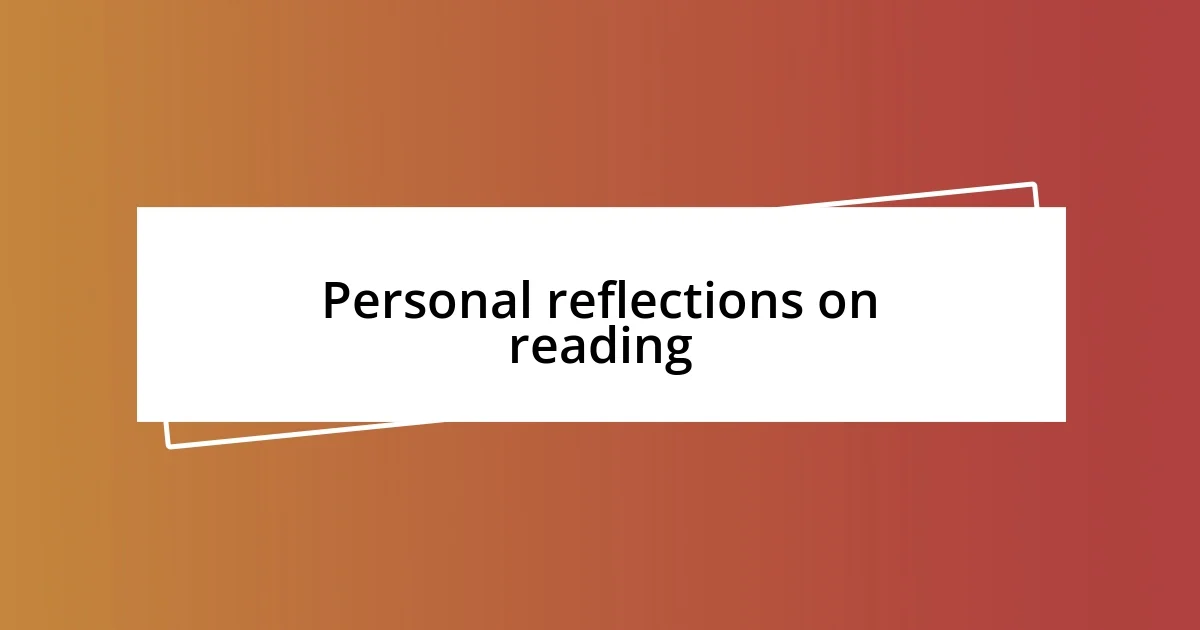
Personal reflections on reading
Reflecting on my reading journey, I often find that the stories I engage with linger in my thoughts long after I’ve turned the last page. I remember grappling with a storyline that mirrored my journey of self-discovery, filled with moments of doubt and passion. This piece made me feel a connection with the protagonist, almost as if I was walking in their shoes, reminding me how literature can illuminate our hidden struggles and aspirations.
Every time I revisit a cherished book, I’m struck by how its messages resonate differently at various stages of my life. A tale of friendship that once seemed light-hearted now reveals deep lessons about loyalty and trust after experiencing my own relationships. Isn’t it intriguing how the lens through which we view a story can shift our understanding? This dynamic process keeps me coming back to literature—it feels like having a conversation with an old friend who knows me well.
Reading has taught me the importance of empathy, fostering a deeper connection with those around me. I recall a particularly emotional narrative about kindness in unexpected places, which inspired me to perform random acts of kindness in my community. Each encounter I initiated not only enriched others’ lives but mine as well, showing that literature can be a catalyst for change in our daily actions.
| Reading Experience | Impact on Worldview |
|---|---|
| Connection with Characters | Empathy and Personal Insight |
| Revisiting Stories | Shifting Perspectives Over Time |
| Inspiration from Themes | Catalyst for Kindness and Change |
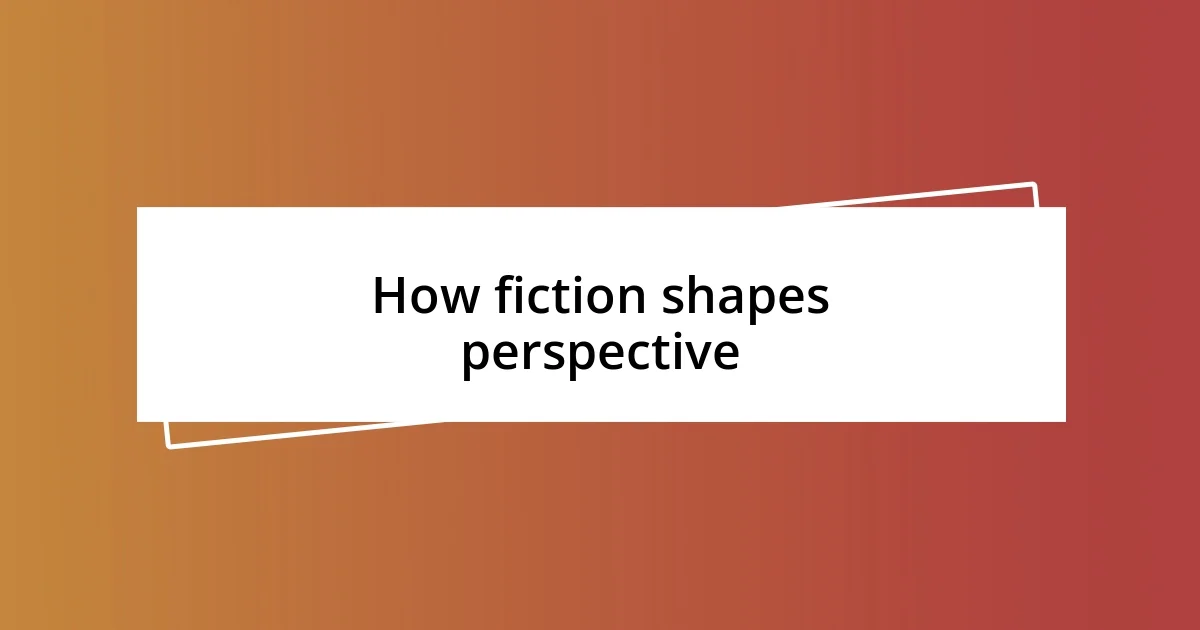
How fiction shapes perspective
When I dive into a work of fiction, I often find myself transported into a different world, which fundamentally shifts my viewpoint. For example, after reading a novel about social injustice and systemic inequality, I felt an urgent impulse to educate myself more about these issues. Why does it take a story to make us stop and think? Maybe it’s because fiction allows us to engage with complex topics on a human level, making them more relatable and less abstract.
One time, I stumbled upon a character whose moral dilemmas mirrored my own. Their choices reflected the internal conflict we all face—do we stay silent in the face of injustice, or do we speak up? This moment was a turning point for me. It sparked conversations with my family, leaving me questioning my own actions and responsibilities in our society. It’s fascinating how fiction provides not just entertainment but serves as a mirror, urging us to confront our values.
With every book, I realize that narratives shape not just my thoughts but my very essence. I vividly remember reading a story that challenged my preconceived notions about love and sacrifice. The sacrifices made by the characters hit home, prompting me to question what I was truly willing to give for the people I care about. It’s powerful how a few pages can inspire profound personal reflection, encouraging us to reevaluate our priorities and relationships. How could that not influence our worldview?
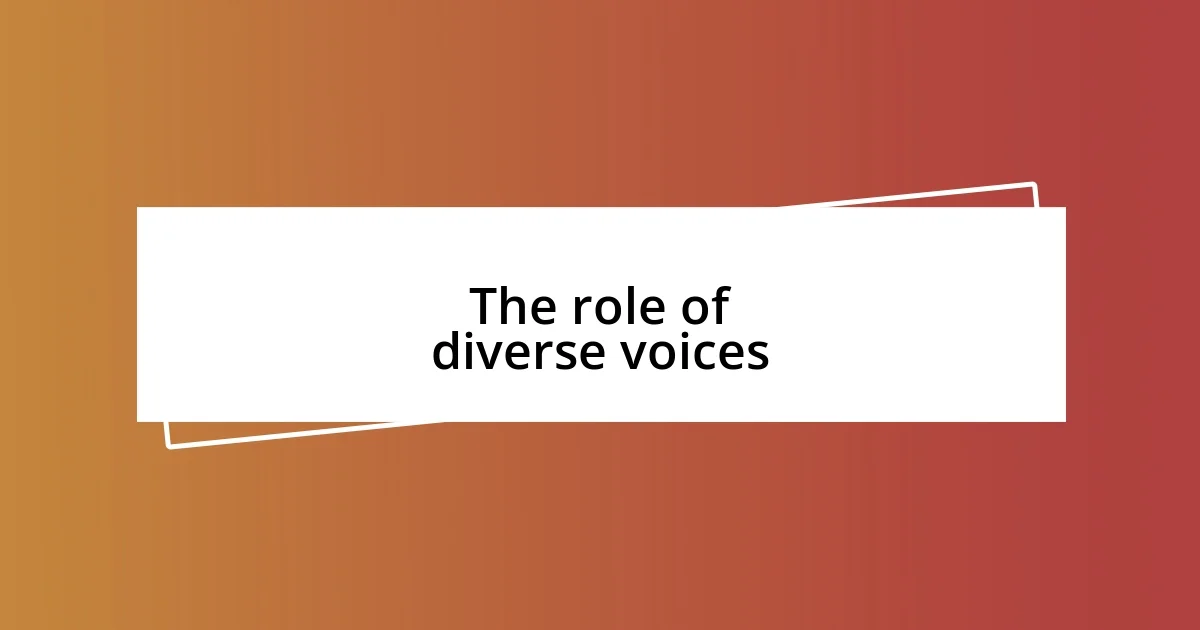
The role of diverse voices
The voices we encounter in contemporary fiction are incredibly varied and offer a wealth of perspectives that have shaped my understanding of the world. I recall reading a memoir-inspired novel from a marginalized author; their experiences of cultural identity and belonging resonated deeply with me. It made me realize how much I had taken for granted and sparked a curiosity about stories that aren’t often told. Why do some voices remain unheard while others dominate the narrative? This question has lingered with me since.
Diverse narratives challenge the status quo, forcing readers like myself to confront biases and assumptions. I remember feeling uncomfortable while reading a story that delved into the brutal realities of life for LGBTQ+ individuals. Initially, I hesitated, but as I pushed through that discomfort, I found a greater understanding of resilience and strength. Can discomfort be a powerful tool for growth? Absolutely—it opened my eyes to experiences different from my own, and I began to appreciate the richness these varied perspectives bring to literature.
Each story I explore adds another brushstroke to my worldview, often igniting a desire to advocate for inclusion. For instance, a novel set in a war-torn country brought tears to my eyes, showcasing the human spirit amidst despair. That narrative drove me to educate myself on global issues and engage in local advocacy efforts. It’s as if these authors are inviting us into their lives, asking us to not only listen but to act. How amazing is it that literature has the power to mobilize and inspire change in ourselves and our communities?
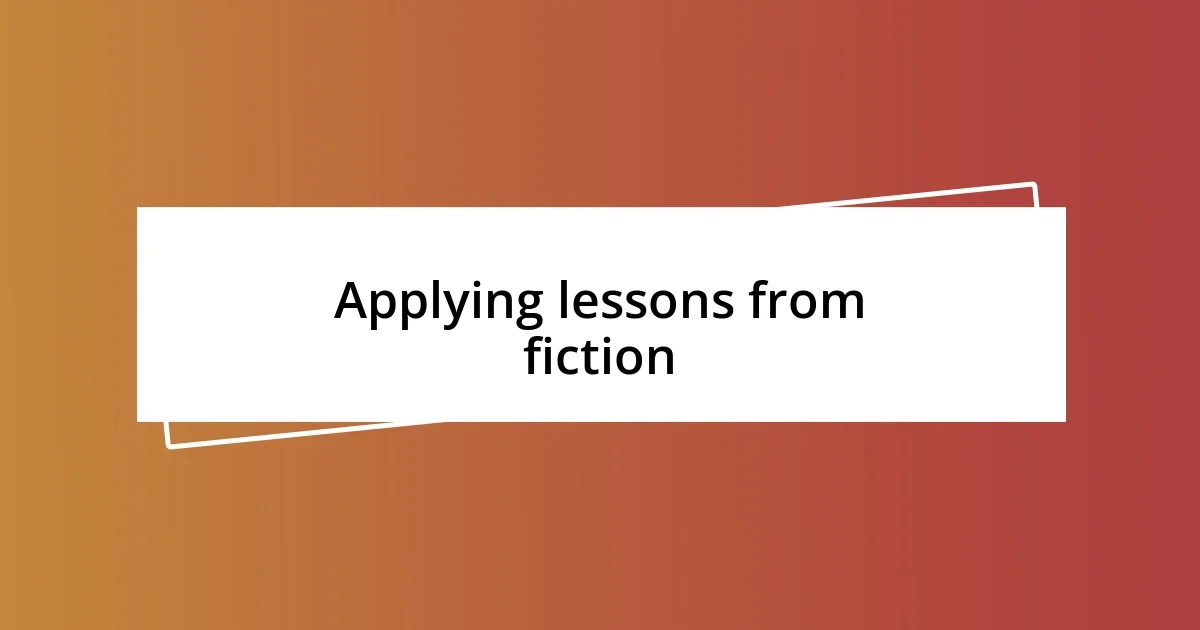
Applying lessons from fiction
Applying lessons from fiction can be transformative and deeply personal. I recall a time when I read a dystopian novel that depicted a society stripped of freedoms. The protagonist’s struggle for autonomy struck a chord with me, igniting a passion for advocating civil liberties. It made me reflect on the privileges I often overlook. Have you ever thought about how freedom, often taken for granted, shapes our daily lives? This story reshaped my understanding of civic responsibility, pushing me to participate in discussions about rights and justice.
The moments of vulnerability experienced by characters in their darkest times often resonated with me on a profound level. I once read about a character grappling with loss, their journey of grief painting a vivid picture of the emotional turmoil that comes with it. As I encountered their pain and gradual healing, I couldn’t help but think of my own experiences with loss. It made me appreciate the importance of emotional honesty in my life. Isn’t it interesting how seeing someone else’s struggle can help us face our own? That book encouraged me to open up about my feelings, fostering deeper connections with those around me.
There are countless lessons woven into the fabric of fiction that I carry into my daily interactions. I vividly remember a character who navigated family conflicts with grace and understanding. Their approach inspired me to adopt a more empathetic stance when facing disagreements with loved ones. It’s incredible how these fictional experiences can lead to real-life changes. How often do we let a story teach us something we desperately need? Each lesson learned reminds me of the boundless potential fiction holds in shaping our understanding of ourselves and the world around us.












